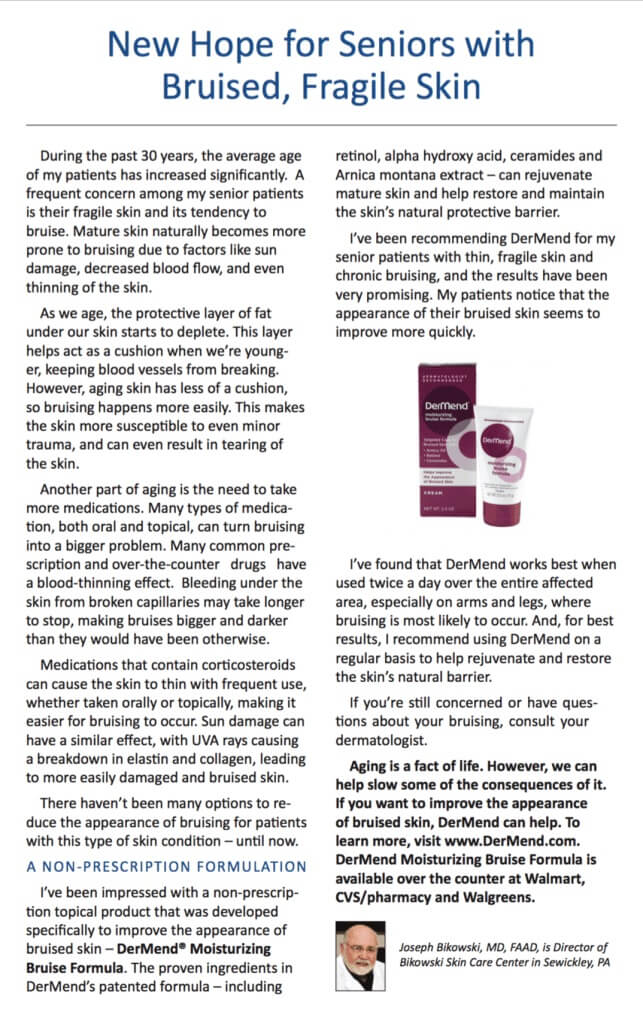Learn More About The Conditions DerMend® Can Help You With:
 “The physicians and mid-levels in our practice diagnose and treat a large population of patients with severe sun damage and easy bruising. Patients that we have instructed in the use of DerMend® Moisturizing Bruise Formula have uniformly reported their pleasure with the prompt resolution of existing bruises and the prevention of new bruising. DerMend® Moisturizing Bruise Formula has been a valuable and effective option for our patients as well as a treatment we can trust to incorporate in our treatment regimen.”
“The physicians and mid-levels in our practice diagnose and treat a large population of patients with severe sun damage and easy bruising. Patients that we have instructed in the use of DerMend® Moisturizing Bruise Formula have uniformly reported their pleasure with the prompt resolution of existing bruises and the prevention of new bruising. DerMend® Moisturizing Bruise Formula has been a valuable and effective option for our patients as well as a treatment we can trust to incorporate in our treatment regimen.”
~ Roger Ceilley, M.D., FAAD, Past President of the American Academy of Dermatology
 “I have been recommending DerMend® Moisturizing Bruise Formula for my older patients with thin skin and chronic bruising. The early results have been very promising. Prior to DerMend® Moisturizing Bruise Formula, there weren’t many options for patients with this type of condition. I’ve tried DerMend® Moisturizing Bruise Formula on over a dozen patients and the response has been excellent. Not only does the bruise seem to lighten more quickly, but my patients also say that they have noticed fewer bruises since starting DerMend® Moisturizing Bruise Formula.”
“I have been recommending DerMend® Moisturizing Bruise Formula for my older patients with thin skin and chronic bruising. The early results have been very promising. Prior to DerMend® Moisturizing Bruise Formula, there weren’t many options for patients with this type of condition. I’ve tried DerMend® Moisturizing Bruise Formula on over a dozen patients and the response has been excellent. Not only does the bruise seem to lighten more quickly, but my patients also say that they have noticed fewer bruises since starting DerMend® Moisturizing Bruise Formula.”
~ Joseph Bikowski, M.D., FAAD
The following online resources can expertly answer many questions about the health of your maturing skin.
See the resources below to learn about the many reasons skin becomes more fragile as it ages. This can lead to easy skin damage and other possible complications if not properly managed.
“Fragile or thin skin that tears easily is a common problem in older adults. Aging, sun exposure and genetics all play a role in thinning skin. Certain medications, such as long–term use of oral or topical corticosteroids, also can weaken skin and the blood vessels in the skin...”
“Thin skin can be dangerous, in that it tears, bruises and cuts easily. It does not usually indicate a serious underlying problem but a trip to the doctors could help ease your mind and find you the right solution you need. There could be a few reasons for damaged thin skin, but thankfully there are also treatments...”
Pruritis, or itchy skin, is one of the most common skin conditions that troubles seniors. The following links help explain why skin is more prone to this problem as it matures, as well as tips for preventing and treating the uncomfortable issue.
“Gravity, facial movement, and sleep position are the secondary factors that contribute to changes in the skin. When the skin loses its elasticity, gravity causes drooping of the eyebrows and eyelids, looseness and fullness under the cheeks and jaw (jowls and “double chin”), and longer ear lobes...”
Many people notice their skin changing as they age, but they don’t know why their skin is bruising more frequently or what can be done about it. Below you’ll find a number of resources to help you better understand what contributes to this bruising as your skin matures.
Easy bruising: Common as you age
“If you're experiencing easy bruising, you might have questions about what's causing the problem and what you can do about it. Find out what role aging plays in bruising and when to consult a doctor...”
“Bruising on the back of the hands and arms is common. Dermatologists call it 'actinic purpura', 'solar purpura' or 'Bateman's purpura'. These flat blotches start out red, then turn purple...”
“It happens to everyone. You bang your toe on the closet door, and before too long, it turns a garish black and blue. But sometimes you spot a bruise and you can't figure out how you got it. Check out these common things that may cause those blotches and learn how to prevent them...”
“Gravity, facial movement, and sleep position are the secondary factors that contribute to changes in the skin. When the skin loses its elasticity, gravity causes drooping of the eyebrows and eyelids, looseness and fullness under the cheeks and jaw (jowls and 'double chin'), and longer ear lobes...”

